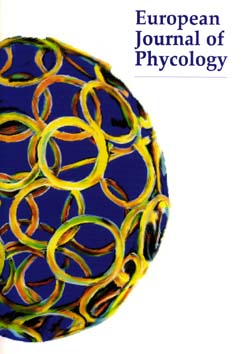Crossref Citations
This article has been cited by the following publications. This list is generated based on data provided by
Crossref.
CEBRIÁN, Emma
BALLESTEROS, Enric
and
CANALS, Miquel
2000.
Shallow rocky bottom benthic assemblages as calcium carbonate producers in the Alboran Sea (southwestern Mediterranean).
Oceanologica Acta,
Vol. 23,
Issue. 3,
p.
311.
Rossi, Sergi
and
Snyder, Mark J.
2001.
Competition for Space Among Sessile Marine Invertebrates: Changes in HSP70 Expression in Two Pacific Cnidarians.
The Biological Bulletin,
Vol. 201,
Issue. 3,
p.
385.
Dyble, Julianne
Paerl, Hans W.
and
Neilan, Brett A.
2002.
Genetic Characterization of
Cylindrospermopsis raciborskii
(Cyanobacteria) Isolates from Diverse Geographic Origins Based on
nifH
and
cpcBA
-IGS Nucleotide Sequence Analysis
.
Applied and Environmental Microbiology,
Vol. 68,
Issue. 5,
p.
2567.
Roberts, Rodney D.
Kühl, Michael
Glud, Ronnie Nøhr
and
Rysgaard, Søren
2002.
PRIMARY PRODUCTION OF CRUSTOSE CORALLINE RED ALGAE IN A HIGH ARCTIC FJORD1.
Journal of Phycology,
Vol. 38,
Issue. 2,
p.
273.
Garrabou, J.
Ballesteros, E.
and
Zabala, M.
2002.
Structure and Dynamics of North-western Mediterranean Rocky Benthic Communities along a Depth Gradient.
Estuarine, Coastal and Shelf Science,
Vol. 55,
Issue. 3,
p.
493.
Pomati, Francesco
Burns, Brendan P.
and
Neilan, Brett A.
2004.
Identification of an Na+-Dependent Transporter Associated with Saxitoxin-Producing Strains of the CyanobacteriumAnabaena circinalis.
Applied and Environmental Microbiology,
Vol. 70,
Issue. 8,
p.
4711.
Martí, Ruth
Uriz, Maria J.
Ballesteros, Enric
and
Turon, Xavier
2005.
Seasonal variation in the structure of three Mediterranean algal communities in various light conditions.
Estuarine, Coastal and Shelf Science,
Vol. 64,
Issue. 4,
p.
613.
Balata, David
Piazzi, Luigi
Cecchi, Enrico
and
Cinelli, Francesco
2005.
Variability of Mediterranean coralligenous assemblages subject to local variation in sediment deposition.
Marine Environmental Research,
Vol. 60,
Issue. 4,
p.
403.
Ballesteros, Enric
2006.
Oceanography and Marine Biology.
p.
123.
Balata, David
Acunto, Stefano
and
Cinelli, Francesco
2006.
Spatio-temporal variability and vertical distribution of a low rocky subtidal assemblage in the north-west Mediterranean.
Estuarine, Coastal and Shelf Science,
Vol. 67,
Issue. 4,
p.
553.
Hereu, Bernat
Mangialajo, Luisa
Ballesteros, Enric
and
Thibaut, Thierry
2008.
On the occurrence, structure and distribution of deep-waterCystoseira(Phaeophyceae) populations in the Port-Cros National Park (north-western Mediterranean).
European Journal of Phycology,
Vol. 43,
Issue. 3,
p.
263.
Balata, David
and
Piazzi, Luigi
2008.
Patterns of diversity in rocky subtidal macroalgal assemblages in relation to depth.
botm,
Vol. 51,
Issue. 6,
p.
464.
Ballesteros, Enric
Garrabou, Joaquim
Hereu, Bernat
Zabala, Mikel
Cebrian, Emma
and
Sala, Enric
2009.
Deep-water stands of Cystoseira zosteroides C. Agardh (Fucales, Ochrophyta) in the Northwestern Mediterranean: Insights into assemblage structure and population dynamics.
Estuarine, Coastal and Shelf Science,
Vol. 82,
Issue. 3,
p.
477.
MARTIN, SOPHIE
and
GATTUSO, JEAN‐PIERRE
2009.
Response of Mediterranean coralline algae to ocean acidification and elevated temperature.
Global Change Biology,
Vol. 15,
Issue. 8,
p.
2089.
Piazzi, L.
Balata, D.
Cecchi, E.
Cinelli, F.
and
Sartoni, G.
2009.
Species composition and patterns of diversity of macroalgal coralligenous assemblages in the north-western Mediterranean Sea.
Journal of Natural History,
Vol. 44,
Issue. 1-2,
p.
1.
Carver, Scott
Bell, Ben D.
and
Waldman, Bruce
2010.
Does Chytridiomycosis Disrupt Amphibian Skin Function?.
Copeia,
Vol. 2010,
Issue. 3,
p.
487.
Nalin, Ronald
Ghinassi, Massimiliano
and
Basso, Daniela
2010.
Onset of temperate carbonate sedimentation during transgression in a low-energy siliciclastic embayment (Pliocene of the Val d’Orcia Basin, Tuscany, Italy).
Facies,
Vol. 56,
Issue. 3,
p.
353.
Moissl-Eichinger, Christine
2011.
Archaea in artificial environments: Their presence in global spacecraft clean rooms and impact on planetary protection.
The ISME Journal,
Vol. 5,
Issue. 2,
p.
209.
Rossi, Sergio
Gili, Josep-María
and
Garrofé, Xènia
2011.
Net negative growth detected in a population of Leptogorgia sarmentosa: quantifying the biomass loss in a benthic soft bottom-gravel gorgonian.
Marine Biology,
Vol. 158,
Issue. 7,
p.
1631.
Gennaro, P
and
Piazzi, L
2011.
Synergism between two anthropic impacts: Caulerpa racemosa var. cylindracea invasion and seawater nutrient enrichment.
Marine Ecology Progress Series,
Vol. 427,
Issue. ,
p.
59.


